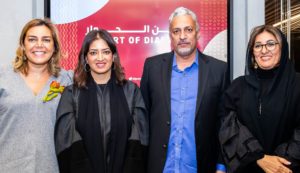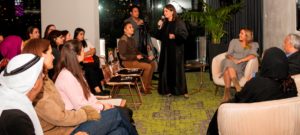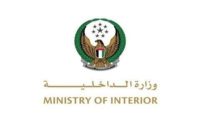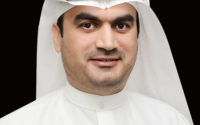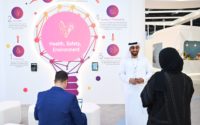Emirati Cultural Pioneers Nujoom Al Ghanem And Mohammed Kazem Emphasise Importance Of Archiving Art
The third edition of ‘The Art of Dialogue’ series saw the Easa Saleh Al Gurg Group (ESAG) host respected Emirati creatives Nujoom Al Ghanem and Mohammed Kazem in a thought-provoking discussion on the early art scene of the Emirates, surveying the cultural landscape in the 1980s through to the mid to late 2000s.
The event, held at the ESAG Design Hub in d3, was well-attended by key players in the local and regional art scene and included artists, curators, gallerists, collectors, government representatives, institutional heads and art practitioners.
Spearheaded by Muna Easa Al Gurg, Director of Retail, ESAG, the series of cultural talks initiated in 2019 is designed to encourage artistic and creative explorations. Moderated by art advisor and cultural strategist Myrna Ayad, the talk focused on the achievements, aspirations and challenges faced by the two artists who have both represented the UAE at the ‘Olympics of the art world’, the Venice Biennale (Kazem in 2013 and Al Ghanem in 2019).
Muna said: “His Highness Sheikh Mohammed bin Rashid Al Maktoum, Vice President and Ruler of Dubai, recently approved the new vision of Dubai Culture, outlining the comprehensive roadmap which will consolidate Dubai’s status as a global destination for culture, innovation and talent. It is important for us to support this vision by reinforcing this creative environment. Events such as The Art of Dialogue give our artists a platform and provide a space for enthusiasts to come together with a community of like-minded individuals to discuss art and culture.”
Considered pioneers of the local and regional art arena, both Al Ghanem and Kazem shared a mentor, the late Hassan Sharif, widely considered the father of conceptual art in the Emirates, whose philosophy and impact was addressed in the panel.
In the discussion, the artists recalled the nascent art scene, opportunities, limitations and experiences they shared as well as their outlook on the current and future landscape. They touched upon the challenges of staying true to one’s art form and resisting convention to create their own artistic interpretations. While the pioneers were appreciative of the emerging culture that supports nascent and establish arts, they are keen to see greater efforts being made to archive early art and the work of pioneers. They also noted the importance of art education as a more formalised study across academic curricula and the establishment of specialized centres for art and creative study.
Describing the art and cultural scene when he first started out, Kazem said: “Things were very limited for anyone with an interest in art and culture. The first library only had two books on art – one on Picasso and the other on Cezanne. Many artists or creative types would get government scholarships to study abroad. Most artwork here was conventional; conceptual art was not really understood, and as a new generation of artists pushing boundaries, we received a lot of criticism. Very few people in the region were making conceptual art in the 80s and 90s and so it took some time for this kind of artwork to be appreciated.”
Al Ghanem highlighted important changes that helped the creative community and attitudes towards art in the UAE. She said: “Activities were very limited and there was an appreciation for mostly traditional or classical literature and art. But there was a big difference with the launch of the Al Khaleej newspaper cultural supplement, and also the establishment of the Sharjah International Book Fair in the 1980s. Both were very significant to the art and cultural scene at the time. Sharjah Art Fair started inviting poets, writers and critics and it was an important opportunity to network for anyone in the community who was creatively minded – we all had our own questions about art and ideas about how we wanted to progress and develop.”
Award-winning poet and filmmaker Al Ghanem recently presented her film, Passage, at the National Pavilion of the UAE at Venice Biennale. A 26-minute, two-channel video, Passage was a site-specific video installation which combined poetry with film to tell the fictional story of Falak, a displaced woman searching for her home. Al Ghanem’s features and documentaries, including Nearby Sky (2014), Sounds of the Sea (2015), Honey, Rain and Dust (2016) and Sharp Tools (2017), have furthered the discourse around gender issues and societal norms.
Kazem has developed an artistic practice that encompasses video, photography and performance, he is widely acknowledged as a regional pioneer. Kazem is acknowledged as one of the ‘Five‘, an informal group of Emirati artists at the vanguard of conceptual and interdisciplinary art practice.
